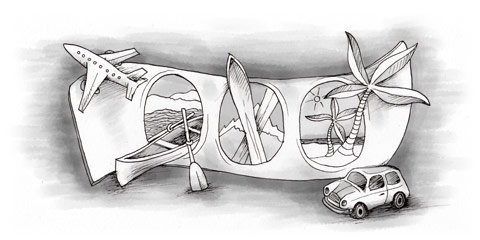In Spain, you can be fined up to €3,000 or even imprisoned for driving without the appropriate level of insurance cover. This is known as obligatory insurance (seguro obligatorio). There are approximately two million uninsured drivers in Spain so make sure that you are properly covered! It is recommended that you carry your original insurance documents or legal copies with you at all times. As some insurers don't issue new documentation every year, you should also carry proof of your most recent insurance payment.
How do I insure my car for Spain?
You can take out insurance on a car that is registered in Spain with any Spanish insurance company or a number of foreign insurance companies in Spain, including direct insurance companies that don’t work through agencies. It is worth shopping around and asking for a number of quotations before choosing a plan or provider.
If you have taken out an insurance policy in your the UK or another EU country, will be have third-party insurance cover in the EU, EEC and Switzerland by ins for a limited period. Some car insurers in the UK provide coverage for for up to six months a year, after which you are required to register your car with your local traffic department in Spain. A lot of providers only provide around 90 days of cover for international travel so it is worth checking your existing policy or taking this into consideration when choosing a provider. If you plan to become a permanent resident, you should register your vehicle within 30 days of arrival.
If you drive a British-registered car and spend over six months a year on the continent, you will need to register your car with the Spanish authorities. You should take out a European Insurance coverage or take out insurance with a Spanish company. Another option is to choose a British insurance company that is based in Spain as EU rules require all vehicles to be insured in their country of registration.
If you bring your British-registered car to Spain, you can insure it through the Spanish branch of a British-based insurance company. However, you won’t be able to insure it with a Spanish insurance company. Similarly, if you have a Spanish-registered car, it must be insured with a Spanish insurance company or a foreign insurance company with an office in Spain.
If you are driving a UK registered car in Spain, it is better to carry documentation that proves that you have not been resident in Spain for more than 6 months. This could include aeroplane or ferry tickets or recent documents from home etc) Consult the Dirección General de Trafico or the Real Automóvil Club de España for more information.
Types of insurance
The following categories of car insurance are available in Spain:
Third-party: Third-party insurance (responsabilidad civil obligatoria or seguro obligatorio) is the minimum required by law. You should make sure that you fully understand the cover provided for the driver and passengers and that it meets your needs. You can choose to pay an extra premium for additional cover up to a specified or unlimited amount (ilimitada), which is highly recommended. Unlimited third-party cover usually costs around €35 extra per year. Note that a driver and his family don’t count as third parties and must be insured separately.
Roadside assistance (asistencia en viajes): This covers glass breakage (rotura de lunas) and legal expenses (defensa penal) in the event of a court case. It may be included in basic third-party cover or can be added to your policy for a premium.
Third-party, Fire & Theft: Third-party, fire and theft insurance (responsabilidad civil obligatoria, incendio y robo) is known in some countries as ‘part comprehensive’ insurance. It includes cover against fire (incendio), natural hazards (e.g. rocks falling on your car), theft (robo), broken glass (rotura de lunas), legal expenses (defensa penal) and occasionally covers damage or theft of contents. In most cases, insurance for a car stereo system can usually only be taken out with the manufacturer.
Comprehensive: Comprehensive insurance (sometimes called ‘fully comprehensive’) is known in Spain as ‘all risk’ (todo riesgo). It covers all the aforementioned risks under third-party, fire and theft insurance; in addition to insuring you for other damage that you or someone else causes to your vehicle. Note that although some insurance companies do not provide comprehensive cover for vehicles that are more than two or three years old, it’s possible to take out comprehensive cover for vehicles up to ten years old. Comprehensive insurance may be compulsory for lease and credit purchase contracts. Note that Spanish insurers do not usually provide a courtesy car whilst your car is being repaired after an accident or breakdown.
Driver & Passenger Insurance: Driver and passenger insurance (seguro de ocupantes) is usually optional and can be added to your insurance policy. Driver protection allows the driver of a vehicle that has been involved in an accident to claim for their own bodily injury, including compensation if they are incapable of working. Beneficiaries can be compensated in the case of death. There are usually various levels of driver and passenger accident insurance, coverage ranging from €3,000 up to €30,000 for death and permanent disability.
Premiums
Insurance premiums in Spain are among the lowest in the EU, although they vary considerably according to numerous factors. They include:
- The insurance plan and provider.
- The type of car and its use: Cars are divided into eight categories, based on their performance, repair costs, where and how much they’re used. Some premiums are based on the number of kilometres driven each year, and whether the vehicle is used for business or pleasure.
- Age, experience and accident record: Drivers with less than two or three years experience and drivers under a certain age, e.g. 25, usually pay higher premiums. Some insurance companies don’t offer coverage to drivers under 25. Drivers aged over 70 may also pay extra, although some companies offer low-cost policies for experienced older drivers over 50 or 55 with a good record. Other companies give discounts of 10 to 20% for experienced drivers of any age.
- Where you live: Premiums are highest in Madrid and other major cities and are lowest in rural areas.
- If you keep your car in a garage: Some insurance companies give an additional discount (e.g. 5%) if you keep your car in a garage overnight.
Some companies offer short-term policies lasting less than a year, which tend to have high premiums, e.g. 50% of the annual rate for three months or 70% of the annual rate for six months. Value added tax (VAT/ IVA) at 16% is payable on insurance premiums. You can reduce your premium by choosing to pay an excess (franquicia).
If you’re convicted of drunk or dangerous driving, your premium will be increased considerably. In fact, if you’re convicted of drunk driving, your insurance company will probably refuse to pay on a claim!
Insurance companies must give two months’ notice of an increase in premiums.
No-claims bonus
An EU no-claims bonus (bonificación bonus-malus) is usually valid in Spain. You need to have had insurance within the last two years and must provide written evidence from your present or previous insurance company - not just an insurance renewal notice. You may need an official Spanish translation . Always insist on having your no-claims bonus recognised, even if you don’t receive the same discount as in your home country.
Most companies offer a 5% discount for each year of no claims, up to a maximum discount of 60%. Some only offer a maximum of 50%. Foreign insurance companies may offer a more generous no-claims bonus than Spanish companies.
If you have an accident, you’re usually required to pay a penalty (multa) or lose your no-claims bonus. You can usually pay an extra premium to protect your no-claims bonus. No-claims bonuses usually apply to a second family car.
Claims
Accident claims are accepted or rejected based on the information provided in accident report forms (declaración de siniestro de automóvil) completed by drivers; reports by insurance company experts and police reports. You must notify your insurance company of a claim within a limited period, e.g. two to five days. Many companies have 24-hour claims helplines in Spain and abroad. If you have an accident, the damage must usually be inspected and its repair authorised by your insurance company’s assessor. In some instances, an independent assessor’s report may be permitted or an inspection may be unnecessary for minor repairs. Note that when a vehicle is written off, Spanish insurance companies usually only pay a percentage of its ‘book’ value, often less than its actual value.
If your car is stolen, you must report it to the local police immediately and submit a copy of the police report with your claim. After you report a stolen car, 30 days must elapse before an insurance company considers the claim.
There’s little communication or cooperation between insurance companies in Spain and trying to recover uninsured losses can be a nightmare.
Cancellation
Spanish insurance companies are forbidden by law to cancel third-party cover after a claim, except in the case of drunk driving or a driver being subsequently disqualified from driving. A company can, however, refuse to renew a policy with 15 days’ notice. Note that if you have an accident whilst breaking the law, e.g. driving under the influence of drugs or alcohol or parking illegally, comprehensive insurance may be automatically downgraded to third-party. This means that you have to pay for your own vehicle repairs and medical expenses.
If you wish to cancel your car insurance at the end of your current term, you must notify your insurance company in writing by registered letter. You are usually required to give two months’ notice. You may cancel your insurance before the term has expired if the premium is increased, the terms are altered, or if your car has been declared a write-off or stolen. If you cancel your valid policy, the insurance company isn’t required to give you a refund.
Breakdown insurance
If you’re driving to and around Spain, it’s important to have motor breakdown insurance (seguro de asistencia en carretera). This can also include holiday and travel insurance, including repatriation for your family and your car in the event of an accident or breakdown.
Motor breakdown insurance that covers Spain and other European countries is provided by car insurance companies and Spanish motoring organisations. 75% of Spanish motorists take out optional accident and breakdown service (asistencia en viaje).
The breakdown service normally covers the policyholder, their spouse, single dependent children and any parents and grandparents living under the same roof. Make sure you keep the 24-hour telephone number of the breakdown service in your vehicle.
If you have an accident or break down, call the breakdown service and tell them your location as accurately as possible - a recovery vehicle will come to your aid. You will be covered anywhere in Spain but must be a certain distance from your home, e.g. 15 or 25 km.
The insurance provides transportation in the event of a breakdown or illness. Necessary transportation to hospital and medical treatment are covered up to a limited amount. An interest-free loan and an emergency message service is normally provided if your car is stolen. The retrieval of your vehicle is also guaranteed within Spain and the EU. If you’re unable to find spare parts locally to repair damage, your insurance company will arrange to have them shipped to you at your expense.
Most foreign breakdown companies have 24/7 all centres with multilingual staff to provide help and advice on motoring, medical, legal and travel matters. Some organisations also provide economical annual motoring policies for those who frequently travel abroad, such as people with holiday homes in Spain.




